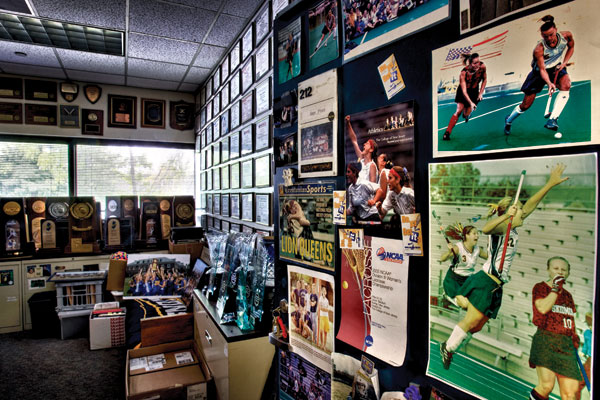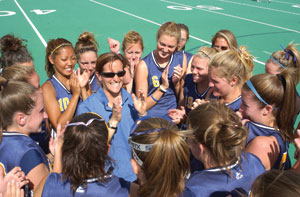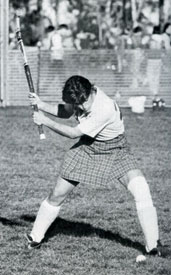Den mother
Sharon Pfluger ’82 has built two sports dynasties—and one big, extended family— at her alma mater.


Jam-packed with trophies, exultant field hockey and lacrosse teams beaming from photos dotting the walls, Sharon (Goldbrenner) Pfluger’s office radiates the emphatic success of a sports dynasty.
For Pfluger ’82, who played on both Lions teams as an undergraduate and has coached them since 1985, the room also functions as a family den of sorts. Point to a photograph and she can name the team and the players, their strengths and challenges still fresh in her mind. Asked this year to nominate a field hockey team for induction into TCNJ’s Athletic Hall of Fame, she went back to her early coaching years, with thoughts of elevating Terry Doyle, a beloved member of the 1990 squad, who died shortly after her team’s championship photo was snapped.
“I just sensed it was the perfect time for that team to be nominated,” she said, tears brimming in her eyes.
That sense of connection—to the team, as well as to individual players past and present—continues to be a powerful motivator for Pfluger nearly three decades after she took over the head coaching job from her mentor, Melissa Magee. It’s also what inspires her to work crazy hours managing both teams, something only a handful of Division III coaches still do. Fifteen years ago, when the College’s athletic director considered splitting the programs to reduce her taxing workload, she agonized for weeks over which sport to pick, but could bring herself to choose one over the other.
“I really, really love both sports, and feel so connected to our loyal alumnae base. It felt like giving up a child,” she laughs.
A cheerful workaholic aided by a dedicated, crackerjack staff of assistant coaches, some of them former players, Pfluger sets the tone for her high-performing athletes, who combine hard-driving determination with a sanity-balancing goofiness. They joke around on the field before practice, but then happily settle in for hours of drills and strategy.

“Games are fun for us, because we just do what we do in practice and it all clicks,” says Meredith Jeffries, a defender on the field hockey team, which cemented a 3-1 victory over Middlebury College in the National Championship game last November. It was the team’s eighth National Championship under Pfluger, named Coach of the Year by the National Field Hockey Coaches Association Division III shortly after, and the first, following several near-misses, since 1999. Extraordinary in its way, the Lions’ success was also a striking illustration of her program’s enduring strength, with its laser-like focus on the team rather than individual glory and on the targeted instruction that enables a range of players to identify and develop skills that ignite their production.
“If they were at all anxious, they just worked harder,” Pfluger says of her scrappy players, who began the season on a rocky note—with two starters sidelined before the first practice—and adapted throughout their schedule to a continually shifting roster.
Jeffries, a junior credited with key defensive plays in the playoffs, exemplifies the brand of self-starters who excel on Pfluger’s teams. While figuring in just a handful of games her first two years, she describes the strategy and regimen that eventually earned her more playing time.
“Speed, endurance, and work ethic are what I brought to the table. When I arrived, my stick skills were not at the level of some of my teammates,” she says. “Through coaching, I learned what I needed to work on and what to fine-tune. Coach Pfluger approaches each player as an individual and she’s great about finding strengths. For my part, I didn’t need a whole bag of tricks. I needed to take two or three strengths and really focus on them. A primary one for me is marking the other team’s toughest player.”
Jeffries says she remained confident in the dry years that her hard work would eventually pay off.
“We’re taught that each day is a new day and it’s all about performance. If you’re not a hard worker, even in practice drills, you won’t play,” she says. “Coach always says that no one is guaranteed a position, even as a senior. At the end of each year, every player attends a one-on-one meeting where she’ll say: ‘We have openings. Where would you like to see yourself and how do you plan to get there?’“
When recruiting, Pfluger says she looks for players with consistency, motivation, and grit—not just the proven stars—also in part because so many of those athletes will win sports scholarships that academically oriented Division III schools do not offer. For years, as TCNJ built its lacrosse team, she identified field hockey players who could play both sports successfully. The Lions lacrosse teams have won 13 championships under her tenure.
“Recruiters’ eyes tend to go to the kid who has the ball the most, but you’ve got to look deeper into the potential a student-athlete may possess, as well as each individual’s personality. These are kids who may not have reached their full abilities, so we’re looking at everything. And I do check references,” she says, adding, “I also really like it when a girl knows she wants to come here. She’s researched us and she sees herself thriving in this program. That shoots a kid way up for me.”
Of Jeffries, she noted, “What a great feeling it gives you to see a player persevere like that. She never got frustrated by her lack of play in her first two years and that positive attitude is what put her on the field.” Jeffries’ tenacity on another front—in the classroom—earned her further distinction this year. She won the NCAA’s coveted Elite 89 award, presented to the student-athlete with the highest cumulative grade-point average participating in the NCAA Final Four. Jeffries, who majors in English and Deaf Education and currently carries a GPA of just under 4.0, hopes to teach and coach someday.
 That can-do spirit is very a much part of the program’s DNA, says Pfluger, who was a freshman in 1978 when the College created its modern sports program by splitting off team sports from the physical education department and hiring Magee, a member of the U.S. national field hockey team, to coach field hockey and lacrosse.
That can-do spirit is very a much part of the program’s DNA, says Pfluger, who was a freshman in 1978 when the College created its modern sports program by splitting off team sports from the physical education department and hiring Magee, a member of the U.S. national field hockey team, to coach field hockey and lacrosse.
“There was no turf at that point, no Recreation Building, just a bunch of hard-driving girls. There were a handful of us who played all the time and who were determined to win,” she recalls,adding that the combination of skillful coaching and determination quickly paid off. Her junior year, the lacrosse team won the first national lacrosse championship for the College by capturing the Association for Intercollegiate Athletics for Women Championship. In 1981, her senior year, women’s sports teams were given the opportunity to join the NCAA. That fall, the field hockey team went 20-0 and won the first-ever NCAA championship for women in any sport.
Three years after she graduated, Pfluger was stunned to receive a call from Magee, who was leaving to manage a Division I team and asked her to apply for the head coaching job. She had been prepping for a full-time opportunity—managing college teams in the afternoons after putting in a full day as a school teacher—and had made her mark through part-time stints as an assistant coach for Drew University in field hockey and later lacrosse, and as head field hockey coach for Kean University and for Montclair State University. She had always thought she would inherit “a work in progress,” however, not step into the winning program run by her idol. It sent her already formidable work ethic into overdrive.
“Unlike Melissa, I was not a USA team player. I was a hard-working kid who wanted to win and to make an impact on people,” she said. “What I did know is that I was capable of outworking anybody—even myself!”
She has retained key lessons from her days under Magee’s tutelage that infuse the team’s culture today.
“You need to be a good teacher—to be able to break lessons down for your players in order to explain them well. In coaching, that means creating the drills that do that and explaining what you’re doing very clearly. Clarity is essential—without it, the relationship breaks down,” she says, adding of Magee, “She had this incredible ability to relate to us as a person, to be an authority figure who was also able to have fun.”
Since taking over as head coach, Pfluger has emphasized team cohesion, inspiring tight bonds among her players.
“They don’t skip practice. They’re always on time. They work hard. But most importantly, they really respect each other. A great athlete who’s not in it for the team ends up slowing the team down,” she says. “The kids who come to play here are joining a family. They fight for each other like sisters, and it’s those bonds that make it okay in a moment of urgency to put pressure on a teammate.”
Such fierce team loyalty has also engendered a slew of unofficial coaches, she laughs, noting that it’s not unusual to receive unsolicited advice from Lions alumnae. On matters ranging from corner shot selection to defensive formations, they call, text, and sometimes simply shout at a player they’re encouraging from the sidelines. She’s hardly put off. In fact, she loves it. As her former players, they are exercising the passionate and abiding sense of team ownership—and family—she works hard to cultivate.
“We are family and that’s what families do—help each other. Our family extends way beyond the team. When our alumnae and alumnae parents offer us well-respected advice, I feel it is a gift. They live it with us. They get to know the kids. They feel like coaches and they’ve earned that right,” she says. “One of the first things I tell the new arrivals is that they own stock in this program, and they’ll still have it after they graduate.”
And she does not forget them. Every player has the initial TD stitched on her uniform to remember Terry Doyle.
“This is a team that fosters deep friendships,” says Jeffries. “I don’t think you can win without that connection.”
Top photo (c) Michael Mancuso. Bottom two photos (c) TCNJ’s Sports Information Office.
Posted on June 7, 2012

